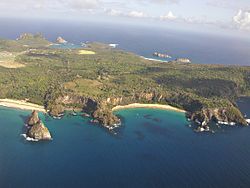
Below is a list of beaches in the Brazilian state of Pernambuco by municipality, from the northernmost Carne de Vaca beach until Coroa Grande at the south end.
Contents
- Goiana
- Itamaracá Islands
- Igarassu
- Paulista
- Olinda
- Recife
- Jaboatão
- Cabo de Santo Agostinho
- Ipojuca
- Sirinhaém
- Rio Formoso
- Tamandaré
- Barreiros
- São José da Coroa Grande
- Fernando de Noronha Islands
- Gallery
- References
The Pernambuco coast has 187 kilometres (116 mi) long [1] plus the Fernando de Noronha islands coast. In Pernambuco are located dozens of beaches of all types, from virgin to urban ones.


















